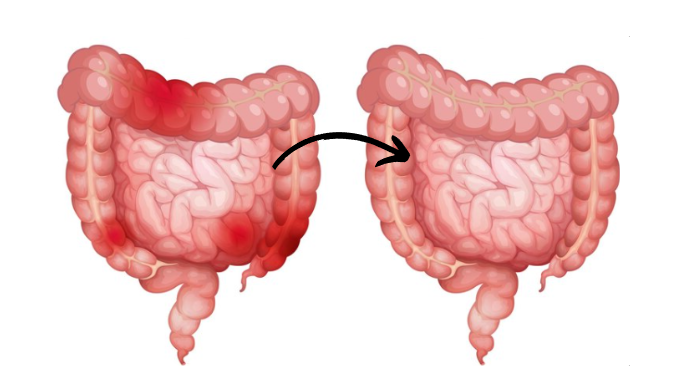What Is Gut Health and How Can You Improve It?

© brgfx / Freepik
Have you ever heard the saying “trust your gut”? Well, it turns out that phrase holds some truth when it comes to your overall health. Your gut, or digestive system, plays a crucial role in your well-being. That is why taking care of it and maintaining its health is essential for a thriving and happy life. But what exactly is gut health, and how can you improve it?
What Is Gut Health?
Gut health refers to the overall well-being and balance of the gastrointestinal tract, particularly the stomach and intestines. A key aspect of gut health is the composition and diversity of the microbiome. It consists of trillions of microorganisms, including bacteria, viruses, fungi, and other microbes. These microorganisms play a crucial role in various bodily functions, such as digestion, nutrient absorption, and immune system regulation.

A healthy gut microbiome is characterized by a diverse and well-balanced community of microorganisms. This balance is important for maintaining the proper functioning of the digestive system and overall health. Disruptions in gut health are often caused by factors like poor diet, stress, antibiotics, and other environmental influences. This can lead to an imbalance in the microbiome, potentially contributing to various health issues.
Why Is Gut Health Important?
The microbiome, unique to each individual, plays a crucial role in health. A diverse array of organisms, primarily bacteria but also viruses and fungi, characterizes a healthy microbiome. In contrast, an unhealthy individual exhibits lower diversity and an increase in bacteria linked to diseases.

The balance of bacteria in the gut is crucial, with some fighting inflammation and others promoting it. When this balance is disrupted, inflammatory bacteria can dominate, producing metabolites that spread inflammation throughout the body. Specific gut bacteria are associated with various conditions. This includes lower immune function, increased risk of asthma, allergies, chronic illnesses (such as diabetes, heart disease, multiple sclerosis, and some cancers), anxiety, depression, and neurological conditions like schizophrenia and dementia. Differences in gut bacteria composition are also observed between lean and overweight individuals. This suggests a potential role in the development of obesity.
Signs of an Unhealthy Gut
An unhealthy gut, influenced by factors such as stress, poor sleep, a Western diet, and antibiotic use, can impact overall health. Signs of reduced gut health include:
- Digestive Issues: Symptoms like gas, bloating, constipation, diarrhea, and heartburn may indicate an unhealthy gut, reflecting difficulty in processing food.
- High-Sugar Diet Impact: Consuming a diet high in processed and sugary foods can reduce the diversity of beneficial gut bacteria, potentially leading to inflammation and related health issues, including cancer.
- Unintentional Weight Changes: Changes in weight without alterations in diet or exercise may signal an imbalanced gut affecting nutrient absorption, blood sugar regulation, and fat storage.
- Sleep Disturbances and Fatigue: An imbalance in gut bacteria may be linked to disrupted sleep patterns and chronic fatigue, possibly related to inflammation, metabolic function, and mental health.
- Skin Irritation: Conditions like psoriasis may be connected to an unhealthy gut, where lower levels of beneficial bacteria impact the immune system and skin health.
- Autoimmune Conditions: An unhealthy gut can increase systemic inflammation and disrupt the immune system, potentially leading to autoimmune diseases where the body attacks its own cells and organs.
- Food Intolerances: Poor quality of gut bacteria may contribute to food intolerances, such as lactose intolerance, resulting in difficulties digesting certain foods and symptoms like bloating, gas, diarrhea, abdominal pain, and nausea. Additionally, research suggests a potential link between food allergies and gut health.
How to Prevent an Unhealthy Gut
To improve and reset gut health naturally, consider the following lifestyle and diet changes:
- Lower Stress Levels: Chronic stress can compromise gut health. Techniques like meditation, walking, spending time with loved ones, and practicing yoga can help reduce stress.
- Get Enough Sleep: Prioritize 7–8 hours of uninterrupted sleep per night, as insufficient sleep can impact gut health and contribute to sleep issues.
- Eat Slowly: Thoroughly chewing food and eating slowly may reduce the risk of obesity and diabetes, promoting better food choices and maintaining a healthy gut.
- Stay Hydrated: Drinking plenty of water, especially from a reliable source, is linked to increased gut bacteria diversity and may reduce the presence of bacteria causing gastrointestinal infections.
Best Foods for Gut Health
To support gut health, focus on consuming foods that promote the growth of beneficial bacteria and maintaining a healthy microbiome. Avoiding processed foods, high-fat foods, and those high in refined sugars is important. Consider incorporating the following four types of food:
- High Fiber Foods: legumes (black beans, chickpeas), whole grains (oats, quinoa), vegetables (broccoli, asparagus), nuts (almonds, pistachios), and fruits (apples, peaches).
- Garlic: may increase gut microbiome diversity and improve gut health, although further human research is needed.
- Fermented Foods: kimchi, sauerkraut, yogurt, and kefir may enhance the gut microbiome.
- Collagen-Boosting Foods: bone broth and salmon skin, as well as collagen-boosting foods like citrus fruits, broccoli, meat, eggs, and nuts.

As always, make sure to contact a doctor if you are experiencing gut health issues.
Disclaimer: The information provided on this website is for general informational purposes only and is not intended as a substitute for professional advice, diagnosis, or treatment. Always seek the advice of your physician or other qualified health provider with any questions you may have regarding a medical condition.
You might also want to read: Brain Health Habits to Improve Mental Health


